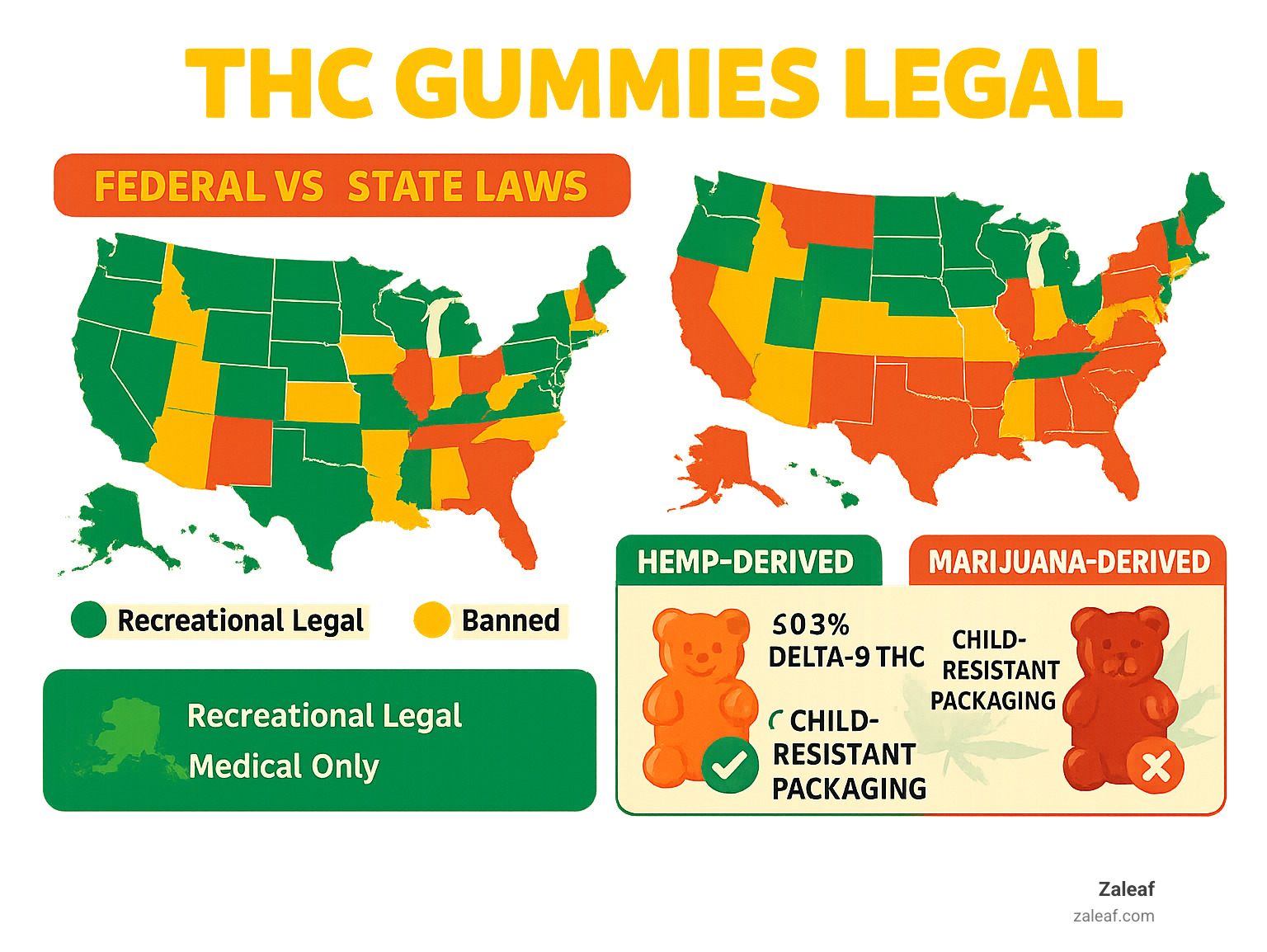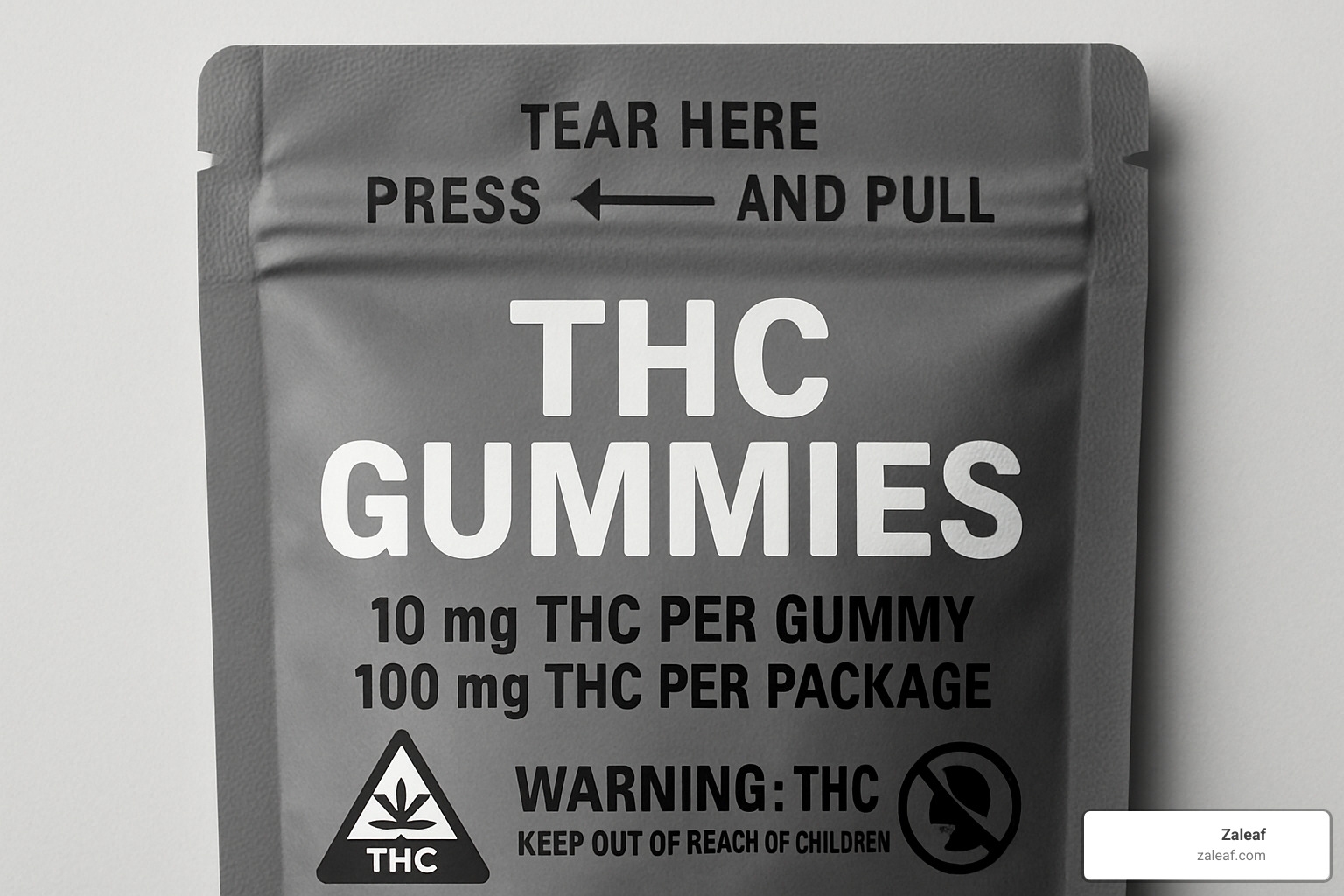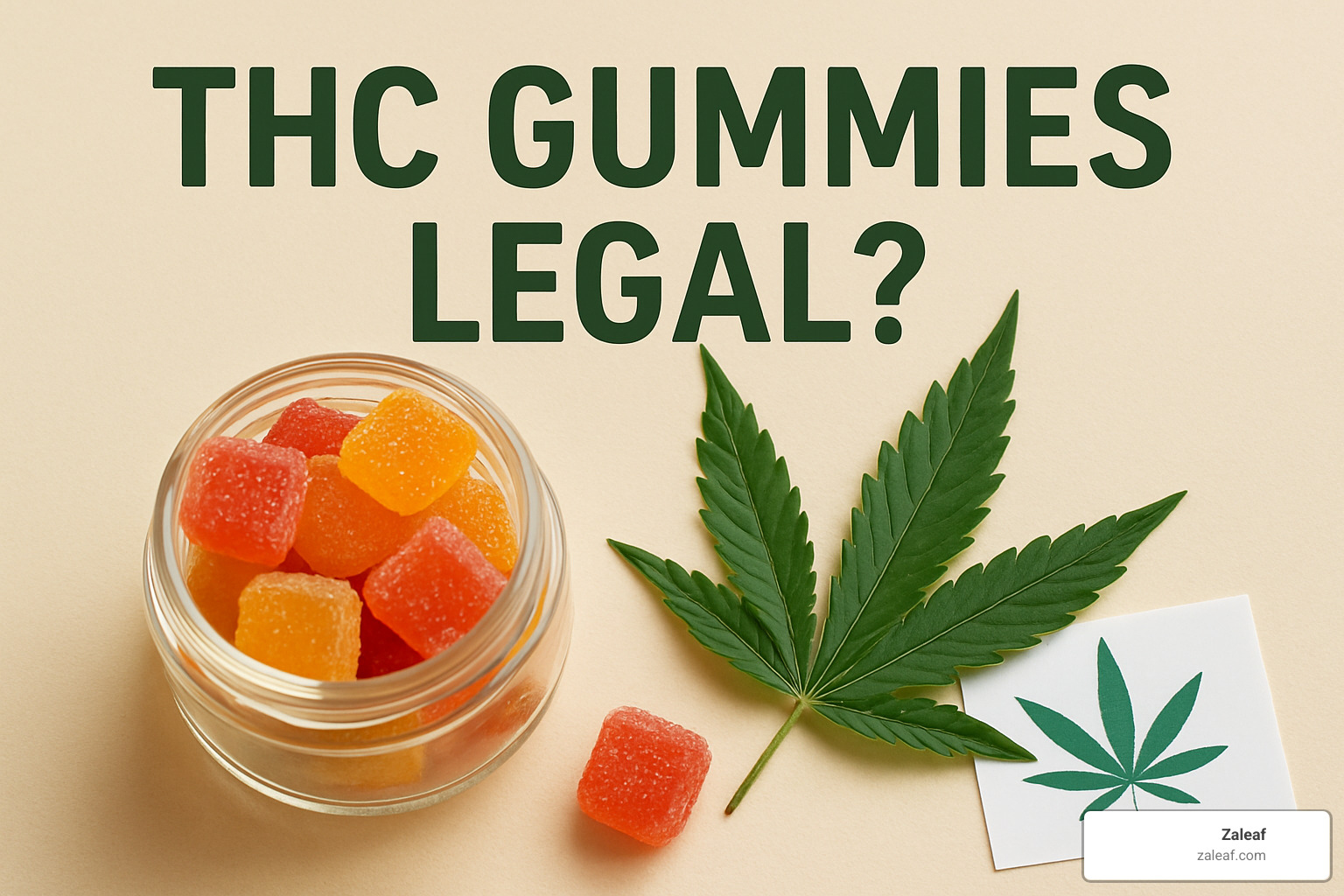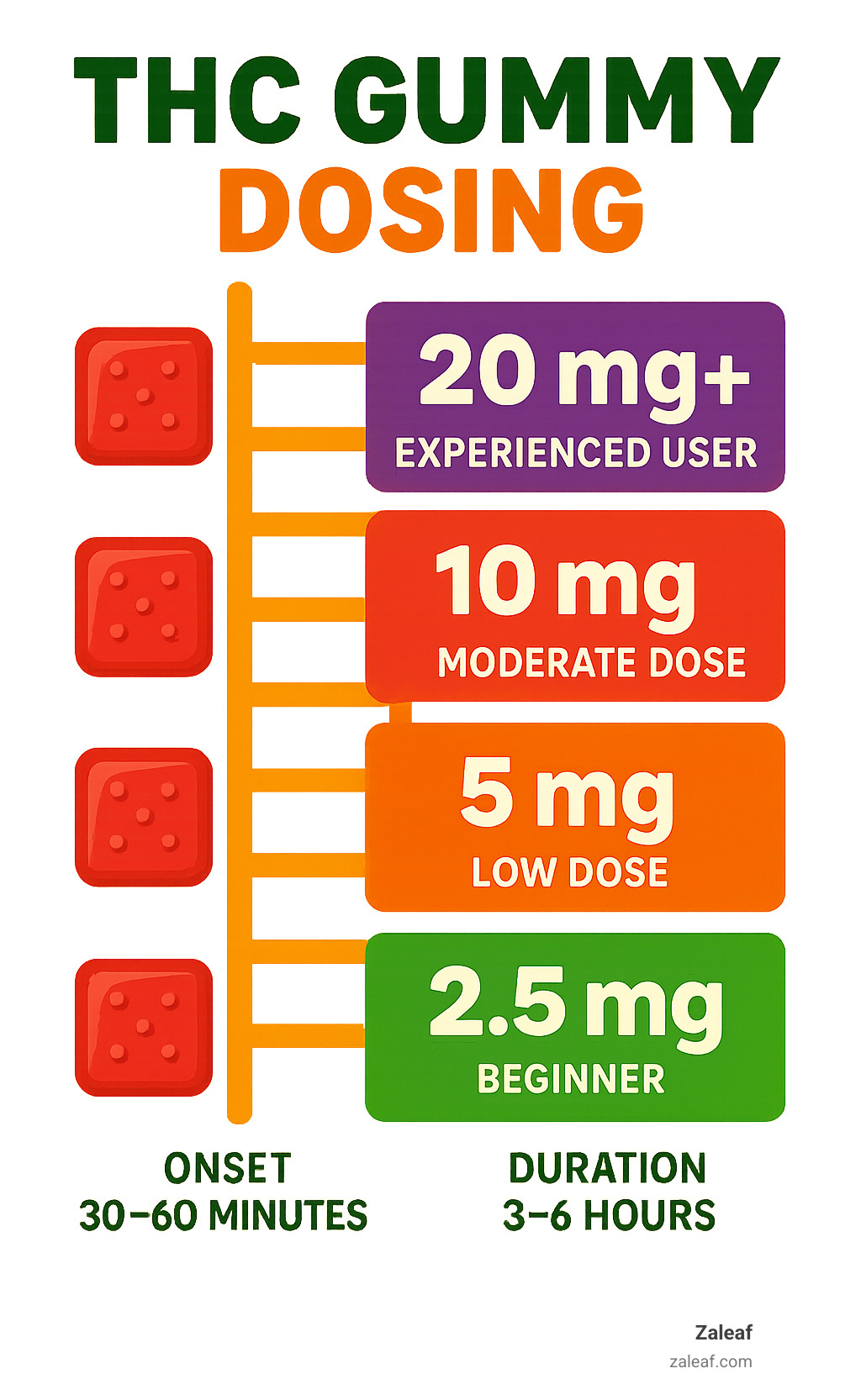Gummy Bear or Gummy Beware – The Truth About THC Gummies Legality

Understanding THC Gummies Legal Status in 2024
THC gummies legal status depends on whether they're hemp-derived or marijuana-derived, plus your state's specific laws. Here's what you need to know right now:
Federal Level: - Hemp-derived gummies with ≤0.3% Delta-9 THC = Legal under 2018 Farm Bill - Marijuana-derived gummies = Still federally illegal (Schedule I)
State Level:
- 24 states: Recreational marijuana fully legal
- 38 states: Medical marijuana programs allowed
- 6 states: All THC products banned (Idaho, Wyoming, Nebraska, Kansas, South Carolina, North Carolina)
Key Compliance Factors: - THC percentage calculated by dry weight - Child-resistant packaging required - Third-party lab testing essential - Age verification (21+) mandatory
The legal landscape gets tricky fast. While hemp-derived THC gummies might be federally compliant, your state could still ban them completely. Even in legal states, possession limits and packaging rules vary wildly.
As Max Shemesh from Zaleaf, I've helped thousands of customers steer these complex regulations while scaling our cannabinoid business across 10+ markets nationwide. My experience in the hemp industry has shown me that understanding THC gummies legal status is crucial for both consumer safety and business compliance.

Thc gummies legal terms to know: - delta 9 thc gummies - THC gummies California - buy edibles online
What Exactly Are THC Gummies & Why Source Matters
Let's get one thing straight - THC gummies legal status isn't just about whether they contain THC. It's about where that THC comes from, and that makes all the difference.
THC gummies are your favorite childhood candy with a grown-up twist. They're infused with tetrahydrocannabinol (THC), the compound that gives cannabis its psychoactive effects. Your body processes these edibles completely differently than smoking or vaping.
When you eat a THC gummy, your digestive system and liver convert the THC into 11-hydroxy-THC. This metabolite is more potent than regular THC, which explains why edibles feel stronger and last longer - 4 to 8 hours instead of 1-3 hours from smoking.
The real game-changer? Whether your gummies come from hemp or marijuana plants. This isn't just cannabis trivia - it's the difference between a product you can legally order online and one requiring a dispensary visit (or being completely illegal in your state).
You've probably heard about Delta-9 THC and Delta-8 THC. Delta-9 is the classic THC that gets you properly high. Delta-8 is its mellow cousin, offering similar but milder effects. Both can be derived from hemp or marijuana, but legal rules change depending on the source plant.
Hemp-Derived Gummies: The Farm-Bill Loophole
Hemp-derived THC gummies exist because of the "Farm Bill loophole" - though it's not really a loophole, just smart interpretation of the law.
The 2018 Farm Bill legalized hemp products containing no more than 0.3% Delta-9 THC by dry weight. The key phrase is "by dry weight." This means manufacturers can create gummies with decent THC amounts while staying under that 0.3% threshold.
Quick math: A 5-gram gummy can legally contain up to 15 milligrams of THC and still meet federal compliance (5g × 0.003 = 15mg). Some companies push further with larger gummies containing 25mg or more while staying perfectly legal.
The extraction methods matter too. At Zaleaf, we use precise extraction techniques to pull cannabinoids from hemp plants while maintaining compliance with federal regulations. Our process preserves the full spectrum of cannabinoids and terpenes, creating the "entourage effect" for more balanced, mood-specific benefits.
Marijuana-Derived Gummies: Dispensary-Only Products
Marijuana-derived gummies are different. These products contain higher THC concentrations - often 5mg to 100mg per piece - and they're only available through licensed dispensaries in legal states.
In recreational markets, any adult 21 or older can walk into a dispensary and buy these gummies without special cards or medical recommendations. Medical markets require patient registration and often have different rules around dosage limits and taxes.
The age limits are standard - you need to be 21 for recreational products, though some medical programs allow younger patients with proper documentation and guardian consent.
What's interesting is the variation between states. Some places cap edibles at 10mg per serving, while others allow medical patients much higher doses. Tax differences can be dramatic too - medical patients often pay significantly less than recreational consumers.
Federal Law 101: From Schedule I to the 2018 Farm Bill
Federal cannabis law is confusing, but understanding it is crucial for knowing when THC gummies legal status applies to you.
Here's the confusing part: marijuana is still a Schedule I substance under the Controlled Substances Act. That puts it with heroin and LSD - substances the government claims have "no accepted medical use and high potential for abuse." Yes, even though 38 states have medical programs.
But then came the 2018 Agriculture Improvement Act (Farm Bill). This legislation removed hemp from the Controlled Substances Act entirely. Hemp is defined as cannabis containing no more than 0.3% Delta-9 THC by dry weight.
Suddenly, hemp-derived products - including THC gummies - became federally legal as long as they stayed under that 0.3% threshold.
The DEA has provided limited guidance on hemp-derived cannabinoids, creating a gray area that's both exciting and nerve-wracking for businesses. Meanwhile, the FDA hasn't approved THC edibles as dietary supplements, but enforcement has been minimal for compliant hemp products.
Delta-8 THC lives in an even grayer area. While it can be derived from hemp, many manufacturers use synthetic conversion processes that raise legal questions. At Zaleaf, we focus on naturally occurring cannabinoids to avoid these complications.
How Much THC Is Legal in a Gummy?
The magic number is 0.3% Delta-9 THC by dry weight. But here's where it gets interesting - that percentage is calculated based on the entire gummy weight, not just the cannabis content.
The calculation formula: Gummy weight (grams) × 0.003 = Maximum legal THC (grams)
So a 5-gram gummy can legally contain up to 15 mg of THC (5 × 0.003 = 0.015g or 15mg). A 10-gram gummy could contain 30mg and still be compliant. This is how hemp-derived gummies can pack a meaningful punch while staying federally legal.
Proper labeling requirements include total THC content per gummy, servings per package, clear dosage instructions, and batch-specific lab results. At Zaleaf, we go beyond minimum requirements with detailed certificates of analysis and QR codes linking to complete lab reports.
This weight-based calculation is why you'll see hefty gummies on the market - manufacturers are working within the law to deliver effective doses while maintaining compliance.
Are THC Gummies Legal? State-by-State Snapshot
The question "are thc gummies legal?" doesn't have a simple yes or no answer. It's like asking if you can drive 70 mph - it depends entirely on what road you're on.
Right now, 24 states plus Washington DC have rolled out the red carpet for recreational cannabis. If you're 21 or older in places like California, Colorado, New York, or Illinois, you can walk into a dispensary and choose from both hemp-derived and marijuana-derived gummies. It's that simple.
But here's where it gets interesting. 38 states total have some form of medical marijuana program. That means 14 additional states beyond the recreational ones allow patients with medical cards to access higher-THC gummies. States like Florida, Pennsylvania, and Ohio fall into this "medical-only" category.
The math gets trickier when you factor in hemp-derived products. Even in states without recreational or medical programs, hemp-derived gummies with ≤0.3% Delta-9 THC remain federally legal under the Farm Bill. This creates a patchwork where you might find compliant hemp gummies in gas stations and CBD shops across most of America.
Six states have said "absolutely not" to all THC products: Idaho, Wyoming, Nebraska, Kansas, South Carolina, and North Carolina. These states have banned everything, regardless of whether it's hemp-derived or meets federal compliance standards.
Possession limits vary wildly between legal states. Colorado lets adults carry up to 2 ounces of edibles, while other states cap purchases at much smaller amounts. Some states even track your purchases across different dispensaries to prevent you from exceeding daily limits.
The shipping rules add another layer of complexity. Hemp-derived products can often be shipped between states, but marijuana-derived gummies must stay within state lines. Even moving legal gummies from Colorado to California can technically violate federal trafficking laws.
Medical vs. Recreational Rules for THC Gummies
Medical cannabis programs often play by completely different rules than recreational markets, and understanding these differences can save you money and legal headaches.
Medical patients typically get the better deal. Many states allow medical patients to purchase edibles with much higher THC content - sometimes 100mg or more per piece compared to the standard 5-10mg recreational limit. Medical programs also come with significantly lower taxes. While recreational customers might pay up to 37% in combined state taxes, medical patients often pay standard sales tax or even get tax exemptions.
Reciprocity agreements between medical states mean your Florida medical card might work in Pennsylvania or Ohio. This creates a network of legal access that recreational users don't enjoy across state lines.
Age restrictions differ too. Medical programs sometimes allow patients under 21 to access cannabis products with guardian consent, while recreational programs maintain strict 21+ requirements everywhere.
The trade-off? Medical programs require doctor visits, application fees, and renewal processes. You're also limited to specific qualifying conditions that vary by state. Recreational programs let any adult walk in and purchase without jumping through medical hoops.
"thc gummies legal" in Canada & Abroad
Canada took a completely different approach when they legalized recreational cannabis nationwide in 2018. While this sounds more permissive than America's state-by-state system, Canadian edible laws are actually much stricter.
Canada limits all edible products to just 10mg of THC per package - not per piece, but per entire package. This means a bag of Canadian gummies might contain 10 pieces with 1mg each, making them significantly weaker than many U.S. products where single gummies can contain 10-15mg or more.
The UK maintains zero tolerance for THC products. All cannabis remains a Class B controlled substance, with possession potentially resulting in up to 5 years in prison. Most European countries follow similar prohibition models.
Travel warnings are serious business. Never attempt to cross international borders with any THC products, even if they're legal in both your departure and destination locations. International drug trafficking charges carry severe penalties that aren't worth the risk, no matter how "legal" your gummies might be domestically.
Even domestic air travel within the U.S. exists in a gray area, since airports fall under federal jurisdiction where marijuana remains illegal, despite TSA's stated focus on security rather than drug enforcement.
How to Spot Legal Gummies & Buy Them Safely Online

Identifying legal THC gummies requires knowing what to look for. Here are the essential markers of compliance:
Required Packaging Elements: - Child-resistant packaging that meets CPSC standards - Clear THC content labeling (mg per serving and per package) - Batch numbers for tracking and recalls - QR codes linking to Certificate of Analysis (COA) - Universal cannabis symbol where required by state law - Bilingual health warnings in some jurisdictions
Third-Party Testing Requirements: All legitimate hemp products should provide lab results testing for: - Cannabinoid potency (THC, CBD, minor cannabinoids) - Pesticides and heavy metals - Residual solvents from extraction - Microbials (bacteria, yeast, mold)
At Zaleaf, we go beyond minimum requirements with comprehensive testing that includes terpene profiles and ensures consistent potency across batches. Our customers can access full lab reports through QR codes on every package.
Age Verification: Legitimate online retailers require robust age verification, not just a checkbox. Look for services that verify government-issued ID before completing purchases.
For more detailed buying guidance, check out our comprehensive guide on local buying tips.
Legal vs. Illegal: Red Flags to Avoid

Spotting illegal or non-compliant gummies is crucial for your safety and legal protection. Here are the red flags:
Packaging Red Flags: - Bright, cartoon-like designs that appeal to children - Copycat branding of popular candy (fake Haribo, Sour Patch Kids, etc.) - Missing or unclear THC content information - Claims of THC content exceeding federal limits for hemp products - No batch numbers or lab testing information - Packaging that isn't child-resistant
Product Red Flags: - Synthetic additives or artificial colors not disclosed - Suspiciously low prices that seem too good to be true - No third-party lab results available - Vague or misleading health claims - Products shipped from overseas
We've seen numerous cases of illicit gummies containing dangerous contaminants or wildly inaccurate THC levels. Some black market products have sent children to emergency rooms due to extremely high THC concentrations disguised as regular candy.
California's regulations provide an excellent model - they require plain packaging, accurate labeling, and prohibit shapes or designs that might appeal to children. For more details on state-specific rules, see our guide to California's THC rules.
Responsible Use, Dosing & Safety

Here's the golden rule with THC gummies legal products: start low and go slow. After years of helping customers steer their first experiences with edibles, I can't stress this enough. Unlike smoking, where you feel effects almost immediately, gummies play by different rules.
If you're new to THC gummies, begin with just 2.5 to 5 mg - often half a gummy or less. Your body needs time to process THC through your digestive system and liver, which means effects typically start 30 to 90 minutes after consumption. The full effects might not peak until 2 to 4 hours later.
The biggest mistake? Eating more because "it's not working yet." Trust me, those gummies are working - they're just taking time. Once they kick in, you're looking at 4 to 8 hours of effects, so there's no rushing this process.
For experienced users, the sweet spot often lands around 10 to 20 mg, though some medical patients need higher doses ranging from 25 to 100 mg or more. Tolerance builds over time, so taking occasional breaks helps reset your system.
Never mix THC gummies with alcohol or other substances - this combination can amplify effects unpredictably. Similarly, don't drive or operate machinery for at least 8 hours after consuming edibles. Effects last much longer than expected, and impairment can be subtle but significant.
Keep yourself comfortable by staying hydrated and having snacks nearby. Having a trusted friend around when trying new products is always smart, especially with higher doses.
Can THC Gummies Make You Fail a Drug Test?
Yes, absolutely - and this includes hemp-derived gummies that are perfectly legal. Even tiny amounts of THC in compliant products can accumulate and trigger positive drug test results.
THC can show up in urine tests for 3 to 30 days depending on usage frequency. Occasional users might clear their system in days, while daily users could test positive for weeks. Blood tests typically detect THC for 12 to 24 hours in occasional users, though regular users stay positive longer.
Saliva tests usually catch THC for 1 to 3 days, while hair tests can detect use for up to 90 days. Results depend on consumption frequency, body fat percentage (THC loves fat cells), metabolism rate, and total THC consumed over time.
Even CBD products can cause failed tests if they contain trace THC. If you're subject to workplace testing, consider THC-free isolate products or avoid cannabis products entirely.
What to Do If a Child or Pet Eats a Gummy
This is every parent's nightmare, but staying calm while acting quickly makes all the difference. First, figure out exactly what and how much was consumed - grab the package if possible. Call Poison Control immediately at 1-800-222-1222, and don't hesitate to call 911 if symptoms seem severe.
Watch for lethargy, difficulty walking, rapid heart rate, breathing problems, vomiting, or confusion. Children and pets process THC very differently than adults, and small amounts can be overwhelming for them.
Prevention is key. Store all gummies in locked containers, keep original packaging with dosage information handy, and never leave products where curious hands or paws can reach them. Make sure everyone in your household understands these aren't regular candy.
Poison control calls about kids accidentally eating cannabis edibles jumped from 187 in 2016 to over 4,300 in 2021. Most cases happened because children thought THC gummies were regular candy, which is why proper storage and clear family communication is so important.
Frequently Asked Questions about THC Gummies Legal Status
Let's tackle the most common questions I hear from customers about THC gummies legal status. These are the real concerns people have when they're trying to steer this confusing landscape.
Are hemp-derived THC gummies legal in every state?
Here's where it gets tricky - while the 2018 Farm Bill made hemp-derived products federally legal, six states have said "not so fast" and banned all THC products regardless of their source.
Idaho, Wyoming, Nebraska, Kansas, South Carolina, and North Carolina have all decided that even trace amounts of THC aren't welcome in their borders. This means that even our perfectly compliant hemp-derived gummies could land you in hot water in these states.
The frustrating part? You could legally purchase these same gummies in neighboring states, but crossing state lines makes things complicated. Always check your local laws before ordering - I can't stress this enough.
How do I verify a gummy meets the 0.3% rule?
This is actually easier than most people think, but you need to know what to look for. Every legitimate hemp product should come with a Certificate of Analysis (COA) from third-party lab testing.
The COA is your golden ticket to understanding what's really in your gummies. It should clearly show the Delta-9 THC content as a percentage of the total product weight, not just the cannabinoid extract. Look for numbers that add up - if you've got a 5-gram gummy with 15mg of THC, that works out to exactly 0.3%.
At Zaleaf, we make this super simple with QR codes on every package that link directly to the lab results. No hunting around websites or wondering if you're looking at the right batch. Scan, verify, and enjoy with confidence.
Red flag alert: if a company makes it hard to find their lab results or doesn't provide batch-specific testing, that's your cue to shop elsewhere.
Can I fly domestically with Farm-Bill-compliant gummies?
Technically speaking, yes - since hemp-derived products with ≤0.3% Delta-9 THC are federally legal, they should be fine for domestic travel. But here's the reality check: TSA agents aren't cannabis lawyers.
I've heard stories of travelers having perfectly legal hemp gummies confiscated because the agent didn't understand the difference between hemp and marijuana products. Some airports in non-legal states might give you extra scrutiny, even if your products are completely compliant.
My practical advice? Keep your lab results handy and stick to clearly labeled, professional packaging. Avoid anything that looks like it's trying to be sneaky. If you're traveling to one of those six ban states I mentioned earlier, leave your gummies at home - it's just not worth the risk.
The safest approach is to check both your departure and arrival airports' specific policies before packing. When in doubt, ship your products to your destination instead of carrying them through security.
Conclusion
Navigating the THC gummies legal landscape doesn't have to feel like solving a puzzle blindfolded. While the rules might seem overwhelming at first, they boil down to a few key principles that can guide your decisions.
The federal framework is actually pretty straightforward: hemp-derived products with ≤0.3% Delta-9 THC are legal nationwide, while marijuana-derived products remain federally prohibited. But here's where it gets interesting - your state can still throw a curveball and ban everything, regardless of what federal law says.
Think of it like speed limits. The federal government sets one standard, but each state can make their own rules that are even stricter. Six states have done exactly that with THC products, creating complete bans that override federal permissions.
What really matters for your safety and legal protection comes down to being smart about your choices. The source of your gummies determines their federal status, but your zip code determines whether you can actually possess them legally. Always check both layers before making any purchases.
Third-party lab testing isn't just a nice-to-have feature - it's your proof that what you're buying is actually legal and safe. Those Certificates of Analysis (COAs) are like a product's legal ID card, showing exactly what's inside and confirming compliance with regulations.
Responsible dosing can't be emphasized enough. These aren't regular gummies, and treating them casually can lead to hours of discomfort. The "start low, go slow" approach isn't just good advice - it's essential for a positive experience.
Child and pet safety deserves special attention. Accidental ingestion cases have skyrocketed as these products become more common. Proper storage isn't optional when you have little ones or furry family members around.
The cannabis industry keeps evolving rapidly, with new states legalizing and federal attitudes slowly shifting. What's illegal today might be perfectly fine next year, but what's legal now could also change without warning.
At Zaleaf, we've built our entire business around staying ahead of these changes while keeping everything 100% legal and compliant. Our hemp-derived THC gummies undergo rigorous third-party testing, and we design our cannabinoid and terpene profiles for specific mood effects - all without requiring ID or medical cards.
We believe everyone deserves access to quality cannabis products without legal worries. That's why we focus exclusively on federally compliant hemp products with fast, discrete shipping to most states.
The bottom line: understanding THC gummies legal status helps you make informed choices that keep you safe and on the right side of the law. Whether you're looking for relaxation after a long day, a creativity boost for weekend projects, or better sleep, knowing the legal landscape lets you focus on finding the right products for your needs.
Ready to explore legal THC options? Check out our complete THC gummies collection to experience the difference that quality, compliance, and careful formulation make.
Remember: cannabis laws change faster than social media trends, so always double-check current regulations in your area before ordering. When in doubt, reach out to local authorities or cannabis regulatory agencies for the most current guidance. Your peace of mind is worth the extra research.

